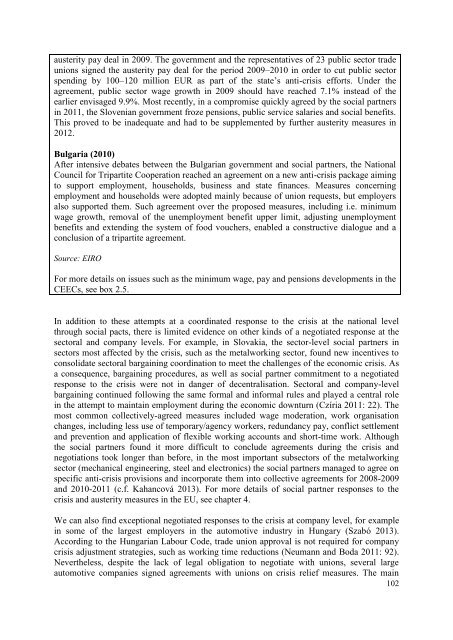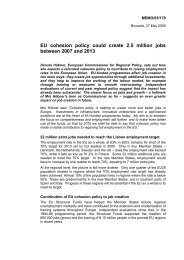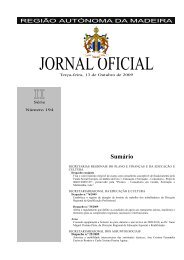Industrial Relations in Europe 2012 - European Commission - Europa
Industrial Relations in Europe 2012 - European Commission - Europa
Industrial Relations in Europe 2012 - European Commission - Europa
Create successful ePaper yourself
Turn your PDF publications into a flip-book with our unique Google optimized e-Paper software.
austerity pay deal <strong>in</strong> 2009. The government and the representatives of 23 public sector trade<br />
unions signed the austerity pay deal for the period 2009–2010 <strong>in</strong> order to cut public sector<br />
spend<strong>in</strong>g by 100–120 million EUR as part of the state’s anti-crisis efforts. Under the<br />
agreement, public sector wage growth <strong>in</strong> 2009 should have reached 7.1% <strong>in</strong>stead of the<br />
earlier envisaged 9.9%. Most recently, <strong>in</strong> a compromise quickly agreed by the social partners<br />
<strong>in</strong> 2011, the Slovenian government froze pensions, public service salaries and social benefits.<br />
This proved to be <strong>in</strong>adequate and had to be supplemented by further austerity measures <strong>in</strong><br />
<strong>2012</strong>.<br />
Bulgaria (2010)<br />
After <strong>in</strong>tensive debates between the Bulgarian government and social partners, the National<br />
Council for Tripartite Cooperation reached an agreement on a new anti-crisis package aim<strong>in</strong>g<br />
to support employment, households, bus<strong>in</strong>ess and state f<strong>in</strong>ances. Measures concern<strong>in</strong>g<br />
employment and households were adopted ma<strong>in</strong>ly because of union requests, but employers<br />
also supported them. Such agreement over the proposed measures, <strong>in</strong>clud<strong>in</strong>g i.e. m<strong>in</strong>imum<br />
wage growth, removal of the unemployment benefit upper limit, adjust<strong>in</strong>g unemployment<br />
benefits and extend<strong>in</strong>g the system of food vouchers, enabled a constructive dialogue and a<br />
conclusion of a tripartite agreement.<br />
Source: EIRO<br />
For more details on issues such as the m<strong>in</strong>imum wage, pay and pensions developments <strong>in</strong> the<br />
CEECs, see box 2.5.<br />
In addition to these attempts at a coord<strong>in</strong>ated response to the crisis at the national level<br />
through social pacts, there is limited evidence on other k<strong>in</strong>ds of a negotiated response at the<br />
sectoral and company levels. For example, <strong>in</strong> Slovakia, the sector-level social partners <strong>in</strong><br />
sectors most affected by the crisis, such as the metalwork<strong>in</strong>g sector, found new <strong>in</strong>centives to<br />
consolidate sectoral barga<strong>in</strong><strong>in</strong>g coord<strong>in</strong>ation to meet the challenges of the economic crisis. As<br />
a consequence, barga<strong>in</strong><strong>in</strong>g procedures, as well as social partner commitment to a negotiated<br />
response to the crisis were not <strong>in</strong> danger of decentralisation. Sectoral and company-level<br />
barga<strong>in</strong><strong>in</strong>g cont<strong>in</strong>ued follow<strong>in</strong>g the same formal and <strong>in</strong>formal rules and played a central role<br />
<strong>in</strong> the attempt to ma<strong>in</strong>ta<strong>in</strong> employment dur<strong>in</strong>g the economic downturn (Czíria 2011: 22). The<br />
most common collectively-agreed measures <strong>in</strong>cluded wage moderation, work organisation<br />
changes, <strong>in</strong>clud<strong>in</strong>g less use of temporary/agency workers, redundancy pay, conflict settlement<br />
and prevention and application of flexible work<strong>in</strong>g accounts and short-time work. Although<br />
the social partners found it more difficult to conclude agreements dur<strong>in</strong>g the crisis and<br />
negotiations took longer than before, <strong>in</strong> the most important subsectors of the metalwork<strong>in</strong>g<br />
sector (mechanical eng<strong>in</strong>eer<strong>in</strong>g, steel and electronics) the social partners managed to agree on<br />
specific anti-crisis provisions and <strong>in</strong>corporate them <strong>in</strong>to collective agreements for 2008-2009<br />
and 2010-2011 (c.f. Kahancová 2013). For more details of social partner responses to the<br />
crisis and austerity measures <strong>in</strong> the EU, see chapter 4.<br />
We can also f<strong>in</strong>d exceptional negotiated responses to the crisis at company level, for example<br />
<strong>in</strong> some of the largest employers <strong>in</strong> the automotive <strong>in</strong>dustry <strong>in</strong> Hungary (Szabó 2013).<br />
Accord<strong>in</strong>g to the Hungarian Labour Code, trade union approval is not required for company<br />
crisis adjustment strategies, such as work<strong>in</strong>g time reductions (Neumann and Boda 2011: 92).<br />
Nevertheless, despite the lack of legal obligation to negotiate with unions, several large<br />
automotive companies signed agreements with unions on crisis relief measures. The ma<strong>in</strong><br />
102

















